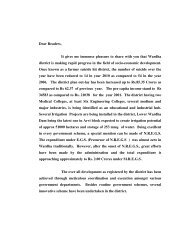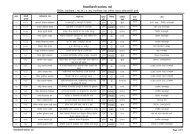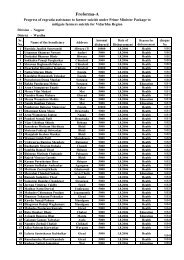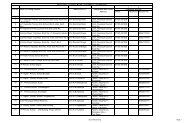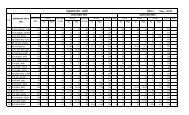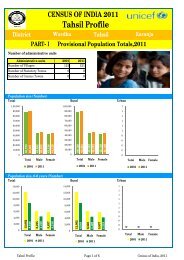Create successful ePaper yourself
Turn your PDF publications into a flip-book with our unique Google optimized e-Paper software.
<strong>Annexure</strong> - D<br />
Animals in Disaster<br />
Disaster disrupts and affects everything in its path, including pets, livestock, and<br />
wildlife. The following section provides general guidelines for handling animals in<br />
emergency and disaster situations.<br />
Pets in disaster<br />
Pets need to be included in household disaster plan since they depend on you for<br />
their safety and well-being. It is important to consider and prepare for your pets before<br />
disaster strikes. Consider the following preparedness measures:<br />
• If you must evacuate, do not leave pets behind. There is a chance they may not<br />
survive, or get lost before you return.<br />
• With the exception of service animals, pets are not typically permitted in emergency<br />
shelters for health reasons.<br />
• Find out before a disaster where pet boarding facilities are located. Be sure to<br />
include some outside your local area in case local facilities have closed.<br />
• Know that most boarding facilities require veterinarian records to prove<br />
vaccinations are current.<br />
• Only some animal shelters will provide care for pets during emergency and disaster<br />
situations. They should be used as a last resort. Use friends and family or keep<br />
them with you.<br />
• Be sure your pet has proper identification tags securely fastened to the collar. A<br />
current photo of your pet will assist identification should it become necessary.<br />
• Make sure you have a secure pet carrier or leash for your pet. They may need to be<br />
restrained during tense emergency situations.<br />
• Assemble a disaster kit for your pet. Include pet food, water, medications,<br />
veterinary records, litter box, can opener, food dishes, first aid kit, other supplies<br />
that may not be available at a later time, and an information sheet with pet's name<br />
and such things as behavior problems. Provide the kit to whoever assumes<br />
responsibility for your pet during a disaster.<br />
Large animals in disaster<br />
If you have large animals, such as horses or cattle on your property, be sure to<br />
prepare before a disaster.<br />
• Evacuate animals whenever possible. Map out primary and secondary routes in<br />
advance.<br />
• Evacuation destinations should be prepared with, or ready to obtain, food, water,<br />
veterinary care, and handling equipment.<br />
65



